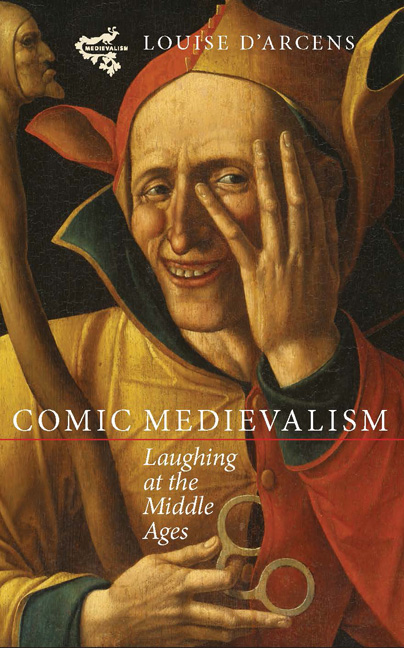Book contents
- Frontmatter
- Dedication
- Contents
- Illustrations
- Acknowledgements
- I THE SET UP
- Introduction: Laughing at, with and in the Middle Ages
- 1 The Cervantean Paradigm: Comedy, Madness and Meta-Medievalism in Don Quixote
- II OLDIES BUT GOODIES: COMIC RECOVERY
- III HIT AND MYTH: PERFORMING AND PARODYING MEDIEVALISM
- IV THAT'S EDUTAINMENT: COMEDY AND HISTORY
- Afterword: Laughing into the Future
- Bibliography
- Index
Introduction: Laughing at, with and in the Middle Ages
from I - THE SET UP
Published online by Cambridge University Press: 05 November 2014
- Frontmatter
- Dedication
- Contents
- Illustrations
- Acknowledgements
- I THE SET UP
- Introduction: Laughing at, with and in the Middle Ages
- 1 The Cervantean Paradigm: Comedy, Madness and Meta-Medievalism in Don Quixote
- II OLDIES BUT GOODIES: COMIC RECOVERY
- III HIT AND MYTH: PERFORMING AND PARODYING MEDIEVALISM
- IV THAT'S EDUTAINMENT: COMEDY AND HISTORY
- Afterword: Laughing into the Future
- Bibliography
- Index
Summary
Comedy is tragedy plus time.
Woody Allen, Crimes and MisdemeanorsMedievalism – the citation, interpretation or recreation of the Middle Ages – has had a major presence in the cultural memory of the modern West. Whether the medieval period is evoked as a superseded age of ignorance and cruelty, a venerable origin of national cultures or a lost age of beauty and social unity, it provides a reservoir of images and ideas that have been crucial to defining what it is to be ‘modern’. For today's audiences viewing medievalism via the body of heroic and fantastic texts emerging out of the nineteenth-century tradition, it would seem that it is a deeply serious business. If any humour is attributed to these magisterial texts and their descendants, it is an unintended humour arising out of their ponderous stylistics, earnest cultural aspirations and historical gaffes. Erudite readers have long revelled in deriding the anachronisms in Walter Scott's Ivanhoe, while the pomposity of nineteenth-century historical verse, such as Adam Lindsay Gordon's Teutonic verse drama Ashtaroth, has drawn mirth from even its earliest audiences. This tenor of high seriousness also characterises some of the most inadvertently hilarious instances of medievalist material culture, such as the Eglinton Tournament of 1839, which was conceived as a refined spectacle of revived chivalry, but ended up as a muddy debacle and an object of sustained public mockery.
- Type
- Chapter
- Information
- Comic MedievalismLaughing at the Middle Ages, pp. 3 - 22Publisher: Boydell & BrewerPrint publication year: 2014



